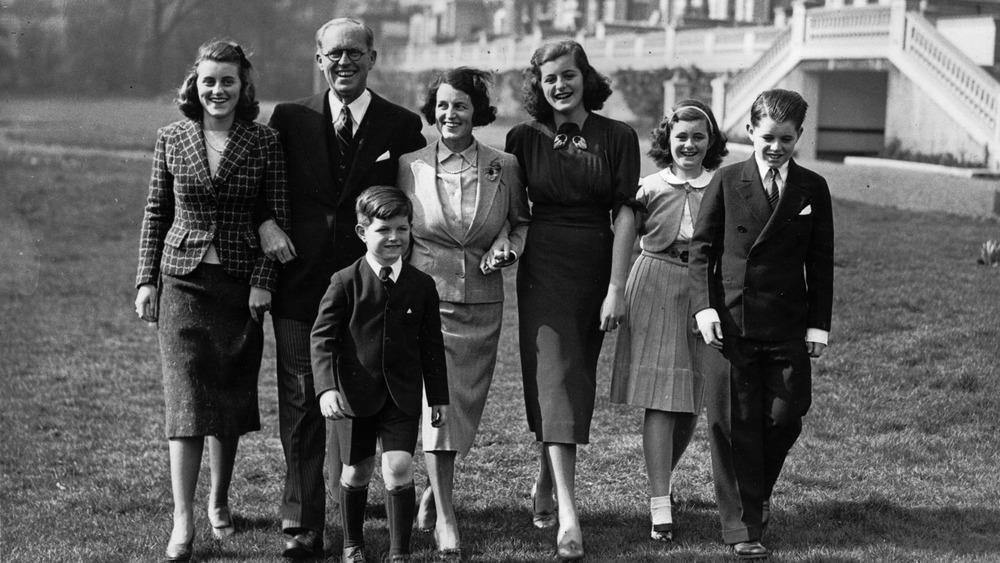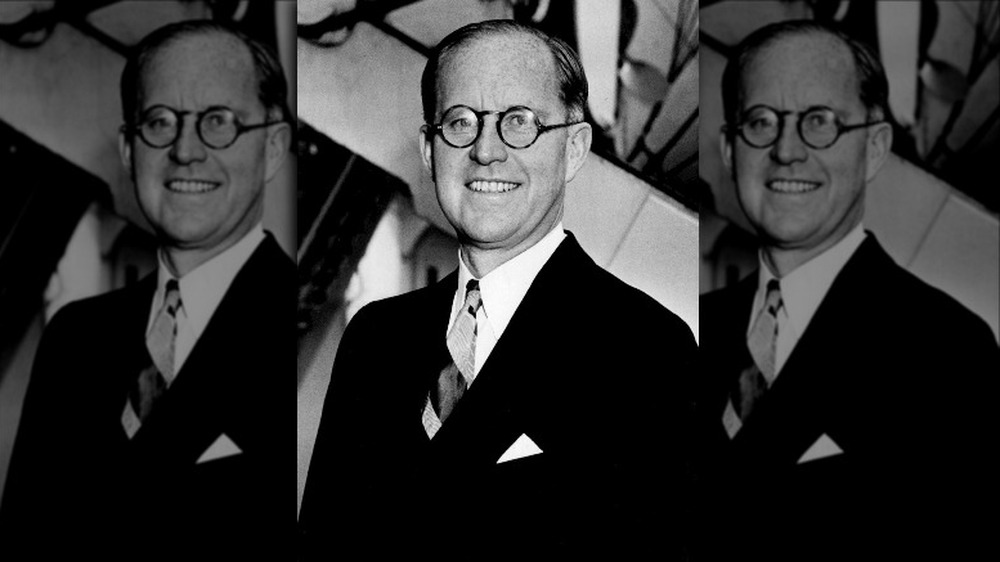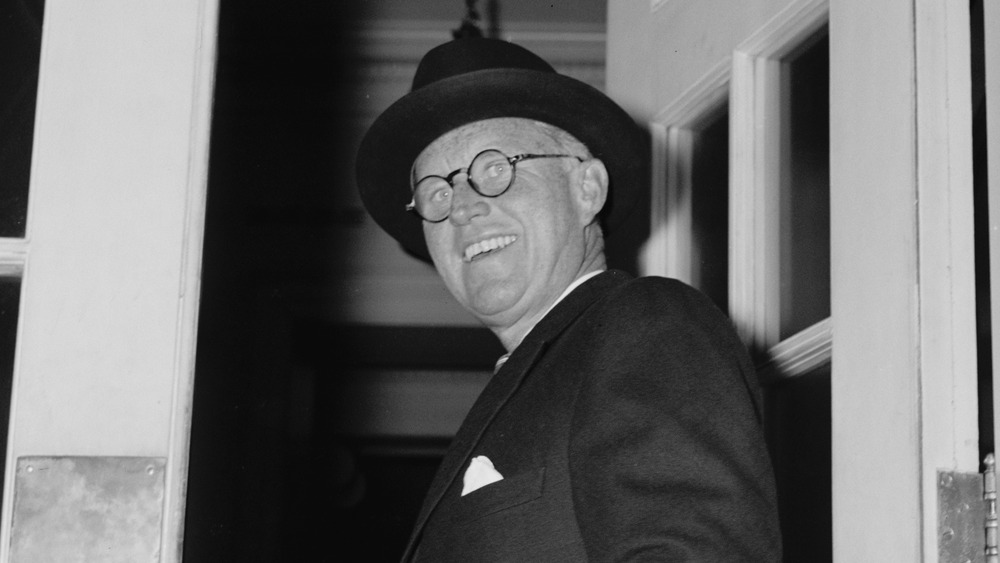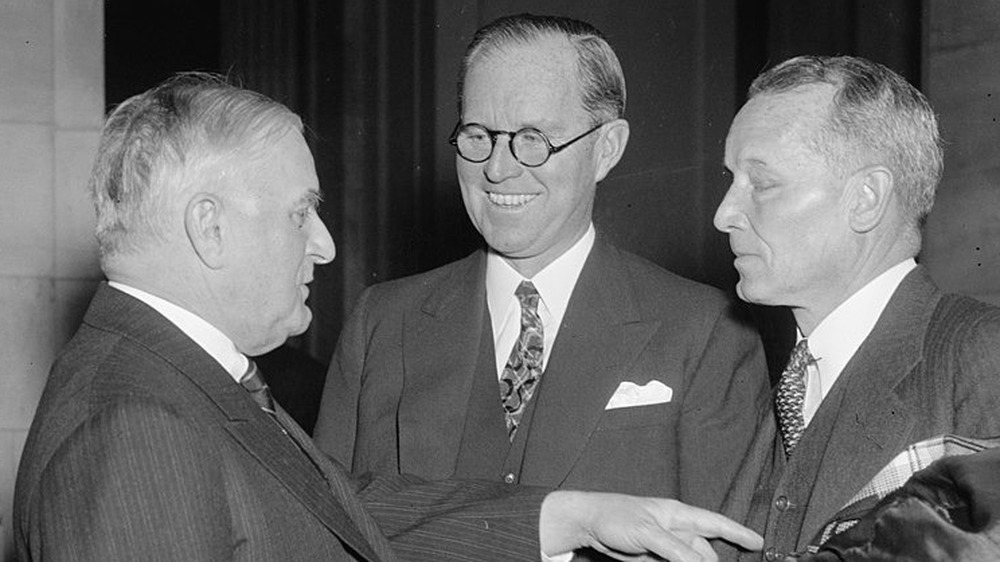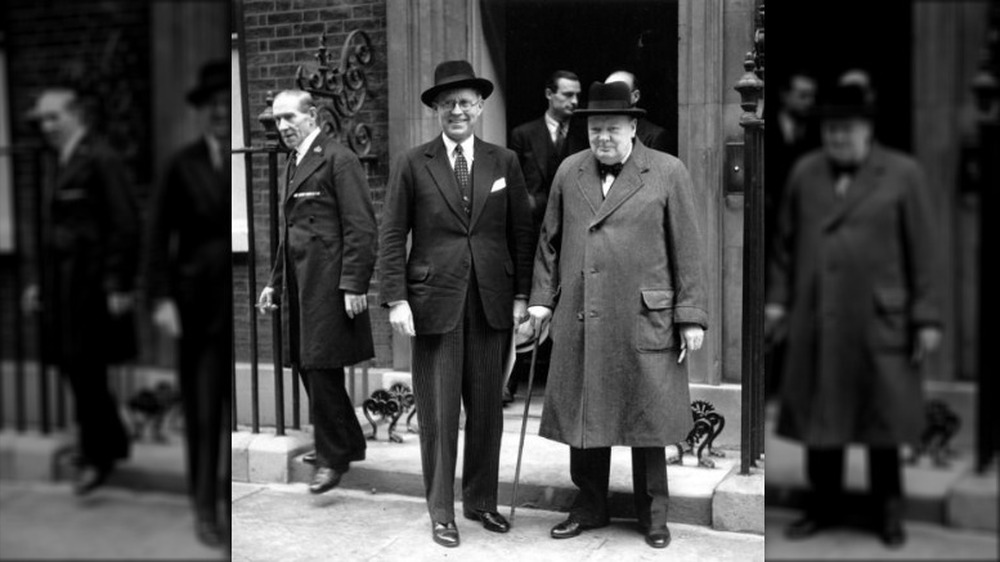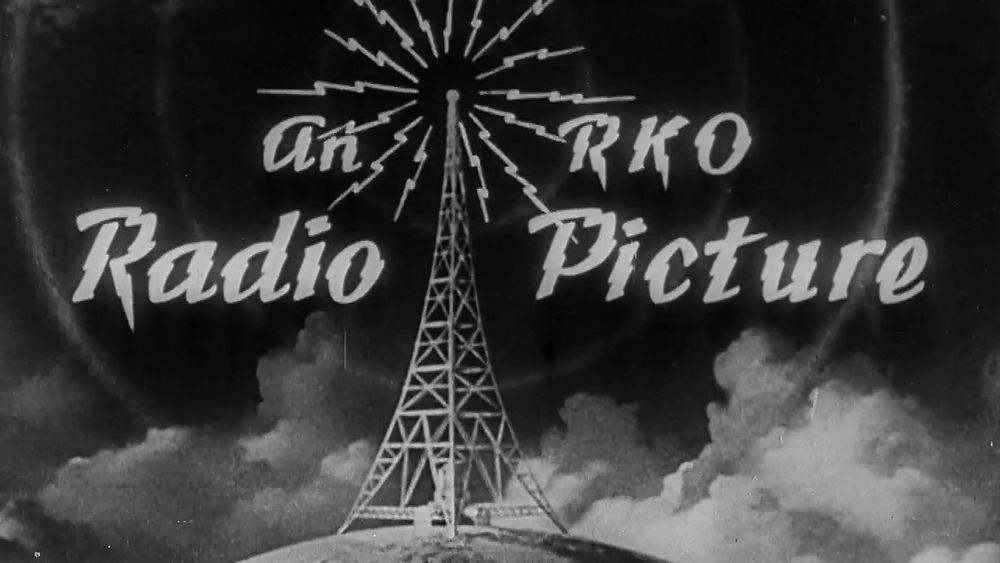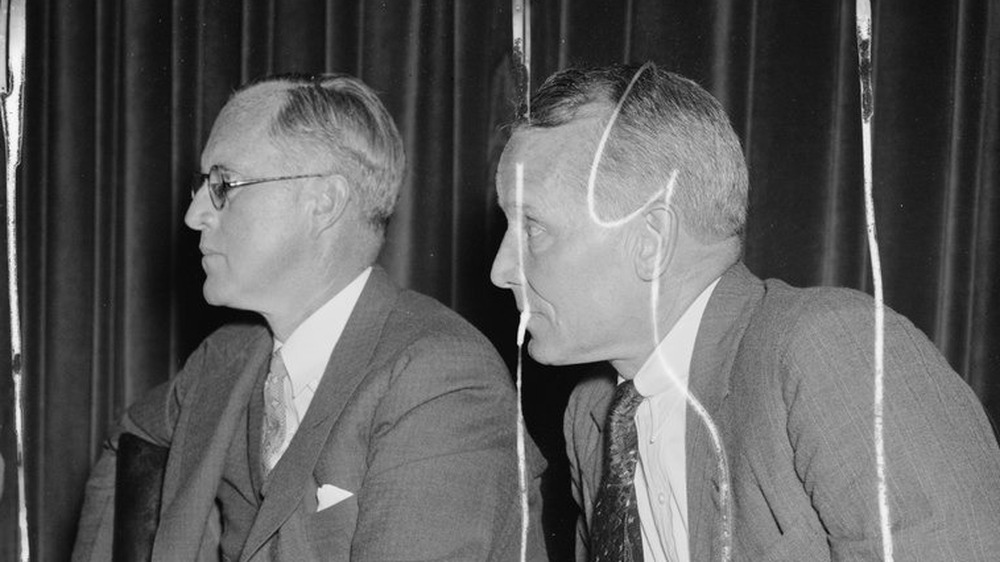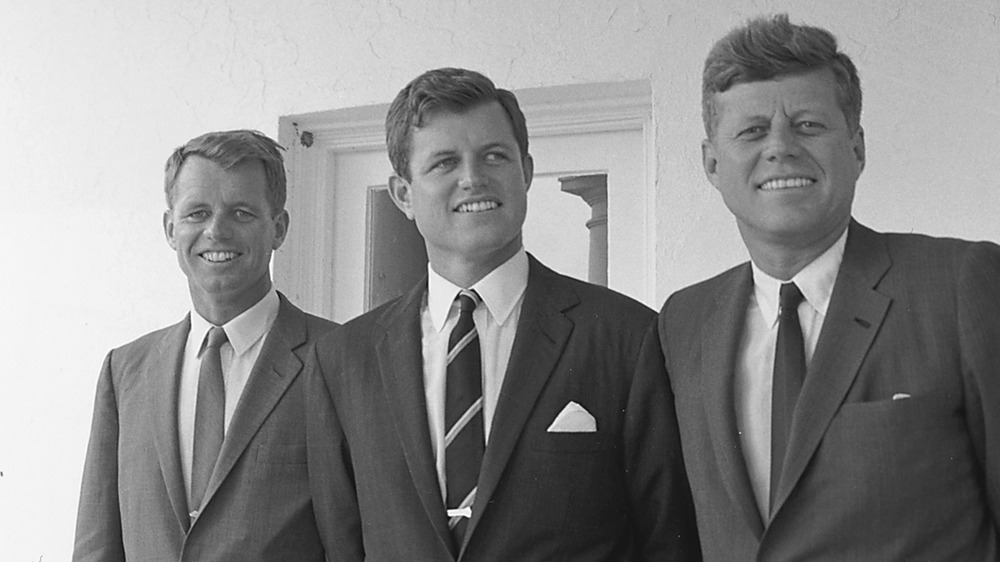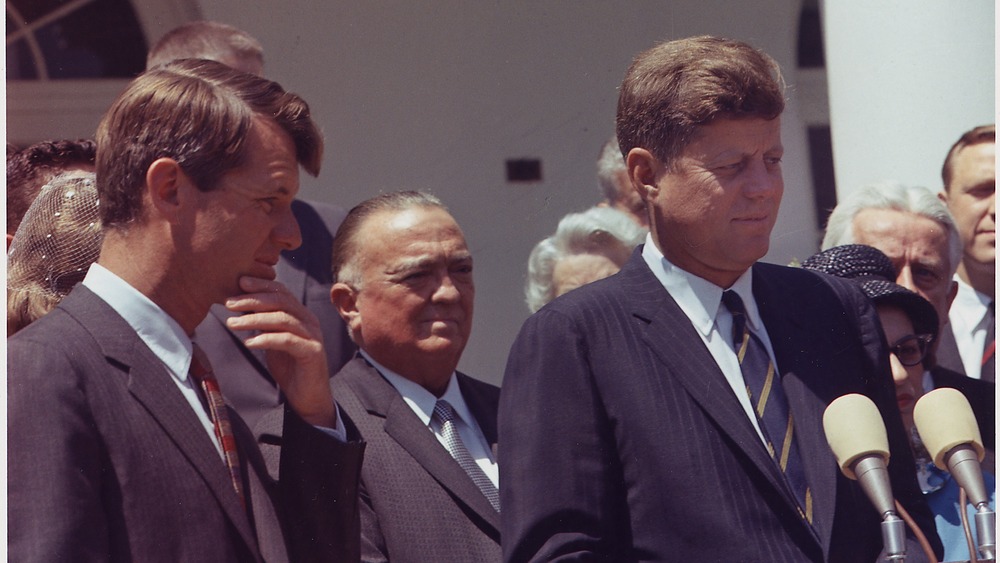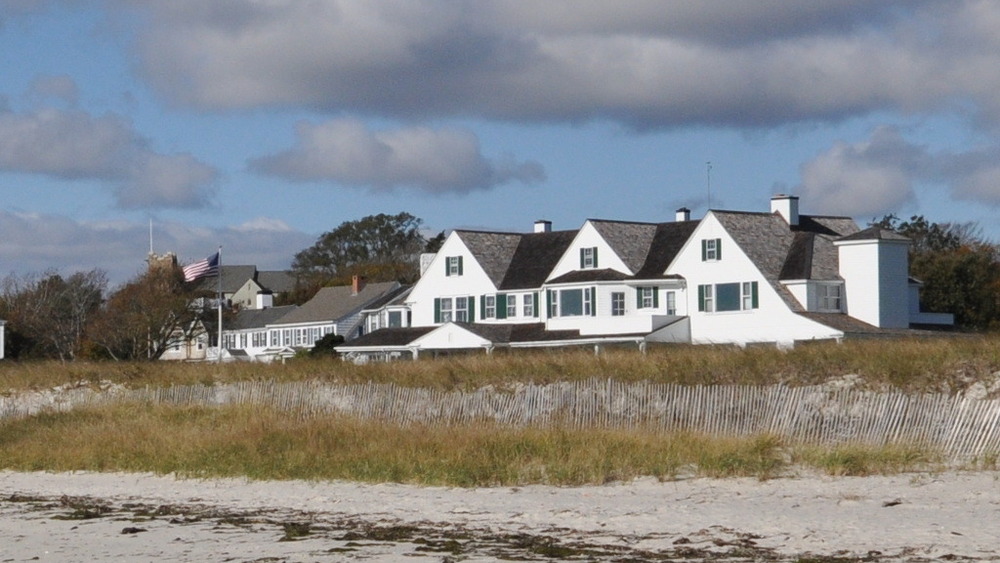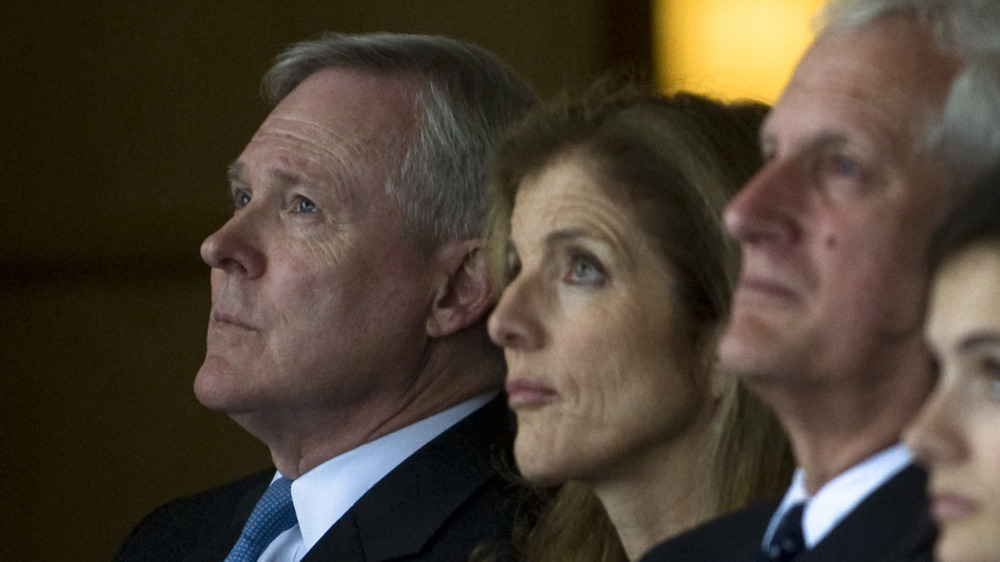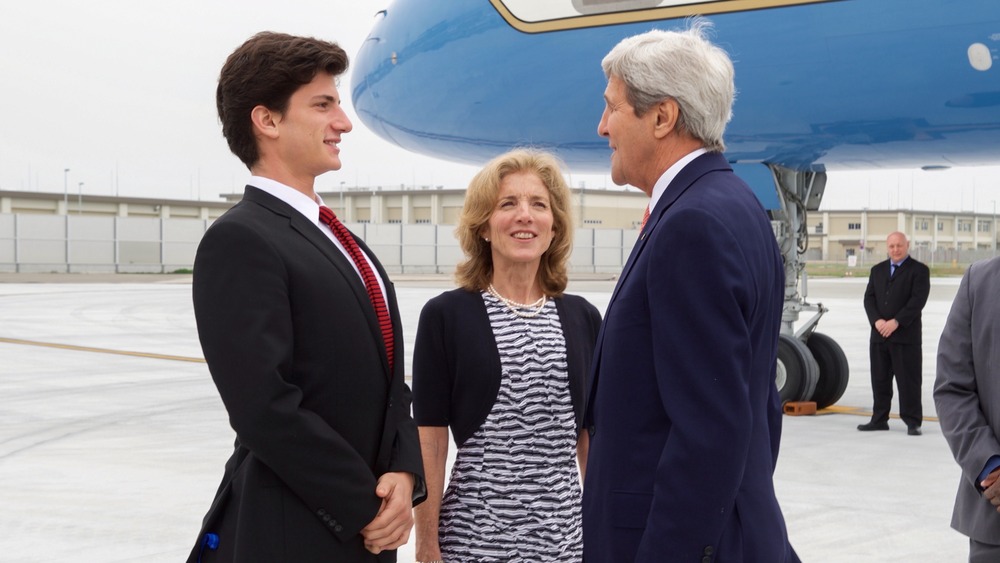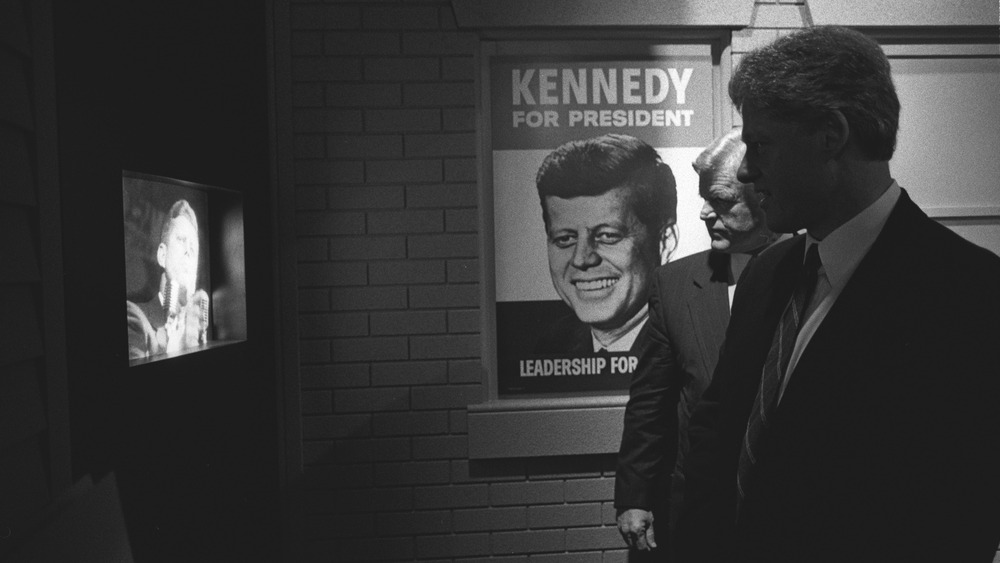How The Kennedy Family Really Got So Rich
You would be hard-pressed indeed to find a single American today who hasn't heard of the Kennedy family. John F. Kennedy may indeed be the most well known, being the 35th president of the United States and the subject of one of the more traumatic assassinations in modern American history. Yet, he was also just one member of a powerful and very, very rich family that's come to dominate an outsized share of American society.
Those family members include three senators and two U.S. ambassadors, who eventually cemented the Kennedy name in U.S. politics. But where, exactly, did the Kennedy family get all of their money from in the first place? Asking a modern day Kennedy will get you practically nowhere, as Forbes reports that they're famously mum about the nature of their cash flow.
It's all a pretty tangled web of investments, agreements, and political wheeling and dealing, to be fair. So, too, is the network of social connections and relationships that are just as key to the Kennedy fame and fortune as a good investment strategy. However, a bit of digging into recent American history makes things quite a bit clearer, especially when the focus is on the Kennedy family patriarch who started it all. Here's how the Kennedy family really got so rich.
It all started with Joseph Kennedy, Sr.
Ultimately, the source of all of the Kennedy family's riches comes down to one man — Joseph Kennedy, Sr. According to Biography, the patriarch of the Kennedy family was born in working-class Boston in 1888. Though attitudes at the time worked against him because he was both a working-class upstart and an Irish Catholic, Joseph proved to be an indefatigable person who simply wouldn't stop. He ultimately secured a spot at Harvard, graduating in 1912. At the age of 25, Joseph was already a bank manager and started donating to the Democratic Party, setting up important political connections that would pan out pretty nicely for Joseph and his descendants.
The enterprising Joseph also married Rose Fitzgerald in 1914, according to Pittsburgh Quarterly. Though Joseph's father had been involved in political circles, Rose's father was none other than the mayor of Boston. Simply put, her family was better-connected than his own. That didn't mean the Fitzgeralds were happy to see their daughter married off to an energetic nobody (never mind that Joseph's father, Patrick, was a small-time politician himself). Rose's father, John, sent her off to a European convent school for a year, apparently banking that the considerable distance would cool off her relationship with Joseph. Clearly, it didn't work.
Their marriage set off a lifetime of establishing important social connections for Joseph, though Rose would be left to play a compliant political wife, raising nine children and turning a blind eye to her husband's affairs.
The Kennedys actually didn't benefit from bootlegging money
One of the most popular stories about Joseph Kennedy maintains that he was a bootlegger during Prohibition. The truth, however, is quite a bit more complicated. As History reports, there's no evidence at all that Joseph associated with bootleggers or was one himself. Those rumors only started to spring up in the wake of President John F. Kennedy's assassination, as people scrambled to understand why someone would kill a sitting president. Some wondered if mobsters may have been involved with the family since Prohibition. Juicy as the story may be, though, it's simply not true.
However, it's pretty clear that Joseph knew how to read the room, historically speaking. Wanting to get in on the legitimate alcohol business before Prohibition finally collapsed, he undertook a transatlantic quest to secure key business interests. According to Time, this meant traveling to Britain, where he met with future Prime Minister Winston Churchill as part of his scheme to establish connections with important figures. It's telling that, right before he left on this trip — which he took with both his wife and mistress in tow, along with his son Joe, Jr., and President Franklin D. Roosevelt's son, James — Joseph created a new business, Somerset Importers. The trip was a resounding success. He secured deeply lucrative contracts to import a variety of liquors to the United States, mere months before Prohibition went bust in 1933.
The Kennedys know how to handle the stock market
By the 1920s, Joseph Kennedy, Sr., was an investor who wasn't all that concerned about the ethics of how, exactly, he got his money. While he never appears to have taken part in anything that would have truly spoiled his political ambitions for both himself and his family, his part in the 1929 stock market crash is in a gray area.
As History reports, Kennedy was already known for his savvy investments by 1929. In that year, he saw his fellow investors taking part in what appeared to be a booming market at first glance. However, Kennedy looked closer and determined that most of those stocks were teetering on the edge. He sold off many of his stocks and began shorting others, effectively betting that they would, very soon, be worth a lot less. When the crash finally came, Kennedy actually made money where others were bankrupted. If all that sounds familiar, it's a pretty similar tactic to that used by people betting against GameStop in 2021, a strategy that was then destabilized by eager Redditors investing in the beleaguered retail company.
Kennedy wasn't above insider trading, according to Pittsburgh Quarterly, though it wasn't strictly illegal at the time. Still, the ever-prescient Kennedy knew that his tactics had a limited shelf life. "We better get in before they pass a law against it," he once said to an associate about the loaded stock market.
For the Kennedys, it's all about who you know
As with many family fortunes, securing and maintaining wealth has a lot to do with who you know. Perhaps Joseph Kennedy, Sr., who was so adept at the stock market, likewise saw hobnobbing as a wise financial investment.
To that end, both he and the rest of his family have made some pretty serious friends over the years. Time reports that future Prime Minister Winston Churchill connected with the Kennedys during their 1930s trip to Britain to secure liquor import deals. On that occasion, Kennedy used his connections with the Roosevelts, already established thanks to some key political donations, to attract potential business partners. Those connections also helped him secure some pretty good jobs with FDR's administration, including his role as the first head of the Securities and Exchange Commission in 1934 (via PBS).
Later connections with rich and influential people proved both influential and tumultuous for the Kennedys. In 1953, Joseph, Sr.'s son, John F. Kennedy, married Jacqueline Bouvier. According to the New Yorker, the Bouviers were an old money sort of family, one that opened up the Kennedy name to a few more powerful circles.
Joseph Kennedy made part of the family fortune through show business
According to Pittsburgh Quarterly, Joseph Kennedy, Sr.'s, first foray into the movie biz came about in the 1920s, when he purchased 31 movie theaters as part of a business group. Realizing that he wanted more power as the owner of a film studio, he attempted to buy one but couldn't get an in with potential British investors. After purposefully crossing paths with the prince of Wales in a Parisian restaurant, Kennedy's charisma earned him a letter of introduction and, ultimately, some high-class British banking money. Once he was in Hollywood, that same charm and business skill brought him into even more inner circles, quickly turning the Kennedy name into a big one in Hollywood.
Ultimately, Kennedy merged his studio, FBO, with another to create Radio-Keith-Orpheum, eventually known as the big deal Hollywood studio, RKO Pictures. As The Patriarch reports, Kennedy then enacted yet more business deals and shuffling around of business shares to come out of the whole experience with more than $15 million of today's money in profit, all in the span of only a few years. Sure, some of that trading was based on insider information, but that wouldn't become illegal until the Securities and Exchange Commission decided it was — under the direction of its first chairman, Joseph Kennedy, Sr.
Joseph Kennedy, Sr., scored some plum government jobs
By the 1930s, Joseph Kennedy, Sr., had firmly established himself as a powerful businessman who was a generous friend to Democratic politicians. As such, Pittsburgh Quarterly reports, Joseph soon became a fixture in the administration of President Franklin D. Roosevelt. Thanks in large part to his close connections with FDR, Joseph became the first chairman of the Security & Exchange Commission on July 1, 1934. It was a job that Roosevelt privately said meant that he had "set a thief to catch a thief."
Though people expected Joseph to act like a crook, he surprised them and kept everything on the straight and narrow, deftly navigating a complicated political landscape full of both friends and enemies. It could be that he was thinking of the political futures of his children. It's hard to secure an election when your dad is a Mr. Burns-style villain, after all.
FDR later named Joseph an ambassador to the United Kingdom from 1938 to 1940. Later, Caroline Kennedy, his granddaughter, would serve as U.S. Ambassador to Japan from 2013 to 2017, as per The New York Times. She proved to be influential as a prominent female diplomat, though some critiqued her as being overly dedicated to American interests and argued that she was a figurehead in part because of her name.
The connections established by Joseph Kennedy, Sr., got his children into important places
Ultimately, though Joseph Kennedy, Sr., engaged in some political work throughout his lifetime, it seems pretty clear that his real governmental ambitions were reserved for his sons. And it all started with Harvard.
Thanks in large part to their dad's efforts and the fact that he had already graduated from the university in 1912, the Kennedy children were pretty much guaranteed admission to Harvard themselves, says The Crimson. Joseph, Jr., got his degree in 1938, followed by his younger brothers John, Robert, and Ted in succession. Other members of the Kennedy family have since graduated from Harvard, showing that, while they aren't the first or only family to benefit from an Ivy League legacy, they are certainly one of the most prominent.
Those connections built by the second generation of Harvard Kennedys helped them win important political elections, like JFK's 1946 election to the House of Representatives, as the Harvard Political Review reports. It snowballed from there, arguably helping JFK secure a seat as a senator and then, by 1960, propelling him all the way to the White House. This opened the way for important political connections, not to mention some serious donations for election campaigns. Even JFK's popular books may have been boosted by not only his family's name but by sales financed through the Kennedy millions.
The Kennedy kids established the family's lucrative political power
Joseph Kennedy, Sr., pushed his children to become what he had really wanted to be himself — a politician. Joseph, Jr., died in a top secret mission for the U.S. military on Aug. 12, 1944, when an explosive aboard his plane detonated unexpectedly and killed both him and his co-pilot, according to the John F. Kennedy Presidential Library and Museum. Before this, he had been his father's primary political focus. With Joseph, Jr.'s, death, says Pittsburgh Quarterly, the next eldest son, John, became the locus of Joseph, Sr.'s, political ambitions.
That focus even helped a young JFK make extra friends, PBS says. John's friends knew that, though he was loaded, he never carried money. No problem, though, as they would pay the tab and then be promptly reimbursed by Joseph, Sr. That sort of wealth later made it all the easier for JFK to donate his $100,000 presidential salary to charity, which certainly helped the optics of his time in the White House.
Joe, Sr., also made significant donations to political groups to help pave the way for his kids. According to Pittsburgh Quarterly, he backed FDR with a pretty significant $25,000 donation back when Roosevelt was still just the governor of New York. That was followed up by even bigger donations and fundraising for FDR's Democratic Party over the years, presumably making it all the easier for a Kennedy to get a warm reception by party members.
Real estate is key to the Kennedy family money machine
As Joseph Kennedy, Sr., surely told his children and close business associates, the key to a good financial strategy is often diversity. All one needs to do is simply look at his business history, which included investments in a wide variety of different ventures, from liquor imports to Hollywood film studios. And, like so many investors before and after him, the father of the Kennedy clan put a fair amount of his money into real estate.
According to PBS, the land and homes owned by the Kennedys are incomparable. There are famous family compounds in upscale locations like Cape Cod and Palm Beach, for one, as well as more commercial properties like Miami's Hialeah Race Track that pay into Kennedy coffers. As The Patriarch tells it, the Kennedys have been investing in real estate for quite a while. In the first couple of decades of the 20th century, Kennedy was already deep into the Boston real estate market, which, of course, earned his family a large income.
Real estate continues to be a significant part of the modern Kennedy fortune, too. According to Forbes, the Kennedy family also has a stake in Vornado Realty, which gives them millions through an investment deal with the company via incorporated entities and trusts. As of 2014, it was estimated that the family had earned $170 million from this deal alone since 1998.
The Kennedy family has learned how to take advantage of tax loopholes
Though most of us earning workaday incomes don't consider the intricacies of tax law much beyond complaining about taxes in general, high-income families like the Kennedys have more reason to get laser-focused on what happens when their money crosses paths with the IRS. And, like ultra-wealthy people who can afford to hire exclusive tax advisors, they've learned how to take advantage of some seriously lucrative tax exemptions.
Specifically, much of the Kennedy fortune has avoided run-ins with the capital gains tax. According to Investopedia, the capital gains tax is essentially a tax levied against investments. When a person or corporation sells an investment, any growth between when the investment was taken on and when it's sold is subject to that tax.
When you're dealing with a lot of investments that could grow quite a bit over time, the capital gains tax can therefore make you feel pretty anxious. Except, as Forbes reports, the Kennedy family appears to have deferred and maybe even completely passed over the capital gains tax for many of their investments. See, there are some significant loopholes in this rule, such as one that skips the tax if you accept partnership units instead of a financial payout. If trusts get involved, then those pesky taxes could eventually go away entirely.
Today, many of the Kennedy riches are squirreled away in trusts
At this point, the Kennedy family is now one of the most recognizable names in America, with a fortune to match. It's also grown beyond the enterprising Joseph Kennedy, Sr., with far more family members who might have access to those funds without the oversight of the family patriarch that originally brought it all together. So, how is a fortune supposed to sustain itself in the face of, say, a wayward family member who's an absolute dud when it comes to money management?
No one's throwing out any names of actual Kennedys here, but, in case that ever happens, the Kennedy money is probably safe. That's because, according to Forbes, a large amount of the family fortune is tucked away in a series of trusts, some of which are managed in Kennedy, Sr.'s name. Joseph P. Kennedy Enterprises ties many of these disparate funds together, which can range from a piddling (for Kennedys, anyway) five figures to millions of dollars.
Yet, while a Kennedy or two might be on the board of the organization, much of the actual work of handling investments falls to outside advisors and money managers. For the Kennedys who collect the money at the end of the day, that's probably just fine by them.
The modern Kennedy fortune is hard to fully examine
If you're trying to dig into the nitty-gritty of the modern day Kennedy riches, you might run into quite a few walls over the course of your quest. Much of the Kennedy family's holdings are now in private securities, meaning that public information about them is pretty tough to come by, says Forbes. Family member Christopher Kennedy said that, "We are a very public family with a very private investment philosophy."
There are some glimpses into the exact state of the fortune, though. As Newsweek reports, Kennedys serving in Congress have had to list their income, just like other senators and representatives. However, also like their fellow politicians, they have been allowed to do so in very broad, difficult-to-track brackets. Ted Kennedy, the youngest of JFK's siblings, earned a $165,200 yearly salary as a senator, though he likely could have forgone that income entirely and hardly noticed. Also, upon Joseph Kennedy, Sr.'s, death in 1969, he left about $400 million ($2.67 billion as of 2018) to his family, setting them up for a good, long while.
